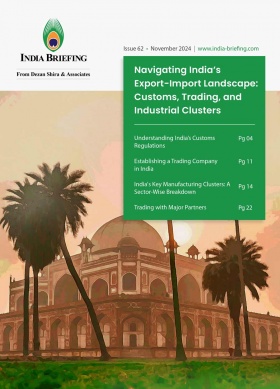India Extends IT Hardware Import Management System Until December 31, 2025
In response to the gap between domestic production and market demand, the Indian government has extended the import management system for seven IT hardware products by one year. Previously set to expire on December 31, 2024, the system will now remain in effect until December 31, 2025.
The global IT hardware market, encompassing laptops, desktops, tablets, and small servers, is valued at an impressive US$400 billion, nearly rivaling the smartphone market, according to ICEA estimates. However, India’s contribution remains minimal, accounting for just US$5 billion, or slightly over 1 percent. For example, over 90 percent of laptops sold in India are imported, predominantly from China, highlighting the nascent stage of the country’s IT hardware industry.
Extension of the IT hardware import management system (IMS)
The Directorate General of Foreign Trade (DGFT) has announced that the import management system for specified IT hardware products will be extended to address the ongoing supply-demand imbalance. The IMS system covers products such as laptops, tablets, all-in-one personal computers (PCs), ultra-small form factor computers, and servers, categorized under HSN 8471.
According to the DGFT notification dated December 11, 2024, importers must secure new authorization for 2025. Applications can be submitted between December 13, 2024, and December 15, 2025.
Key highlights of the import management system for 2025:
- Importers must apply for Import Authorization via the DGFT website.
- The application portal will remain open from December 13, 2024, to December 15, 2025.
- Authorizations issued under IMS will be valid until December 31, 2025.
- Importers may submit multiple applications during the year.
- Requests for amendments during the validity of an authorization can also be submitted through the DGFT website.
While the operational framework of the system remains largely unchanged, the government will monitor progress in domestic manufacturing, particularly under the Production Linked Incentive (PLI) Scheme for IT Hardware. Notably, two major global firms are slated to begin manufacturing operations in India from April 2025.
Status of the ‘PLI Scheme 2.0 for IT Hardware’
Despite efforts to boost domestic production, many of the 27 manufacturers approved under the PLI scheme are struggling to meet their targets for FY 2024-25. This shortfall is largely attributed to major PC companies favoring imports over meeting local content requirements.
Several approved companies have yet to commence production, and those that have begun are operating at low volumes, insufficient to meet revenue or production targets. Many participants are still in the process of making their initial investments under the scheme.
While firms like VVDN Technologies, Flextronics, and Bhagwati (Micromax)—in their first year—are on track to meet targets, others, such as Dixon Technologies, are facing challenges. Dixon, which had previously met targets under the original PLI scheme, is expected to inaugurate a new facility in Chennai but may miss its FY 2024-25 goals. Full-scale production across most beneficiaries is not anticipated before FY 2025-26, according to industry executives.
Geopolitical developments, such as the potential imposition of a 25 percent tariff by the US on laptops and smartphones imported from China, may provide an impetus for India’s IT hardware manufacturing sector. China currently exports approximately US$30 billion worth of IT hardware to the US annually.
Understanding how the PLI scheme works
The PLI Scheme for IT Hardware aims to generate INR 1.6 trillion in production over its six-year tenure, offering incentives of up to 13 percent, including benefits for local sourcing.
India imported US$8.4 billion worth of IT hardware in FY 2023-24, a slight decrease from US$8.7 billion in FY 2022-23. To qualify for PLI incentives, companies must meet the following thresholds:
- Global IT hardware companies (e.g., HP, Dell): Invest INR 5 billion over six years and achieve incremental production of INR 10 billion in the first year.
- Hybrid-category companies (e.g., Dixon): Invest INR 2.5 billion and achieve incremental production of INR 5 billion in the first year.
- Domestic companies: Invest INR 200 million and achieve incremental production of INR 500 million.
Investment breakdown (as of June 30, 2024):
- Total cumulative investment: INR 4.64 billion
- Brownfield companies: INR 3.86 billion
- Greenfield companies: INR 785.7 million
The PLI Scheme for IT Hardware was first notified on March 3, 2021, with the PLI Scheme 2.0 announced on May 29, 2023.
About Us
India Briefing is one of five regional publications under the Asia Briefing brand. It is supported by Dezan Shira & Associates, a pan-Asia, multi-disciplinary professional services firm that assists foreign investors throughout Asia, including through offices in Delhi, Mumbai, and Bengaluru in India. Readers may write to india@dezshira.com for support on doing business in India. For a complimentary subscription to India Briefing’s content products, please click here.
Dezan Shira & Associates also maintains offices or has alliance partners assisting foreign investors in China, Hong Kong SAR, Dubai (UAE), Indonesia, Singapore, Vietnam, Philippines, Malaysia, Thailand, Bangladesh, Italy, Germany, the United States, and Australia.
- Previous Article India-Morocco Strategic Partnership: A Convergence of Regional and Global Aspirations
- Next Article India Eyes US$3 Billion Incentive Package to Boost Electronics R&D and Manufacturing








